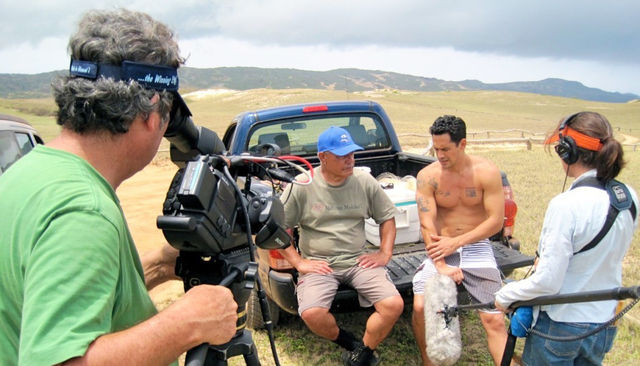LIHUE — In the opening scene of “Fishing Pono: Living in Harmony With the Sea,” a Native Hawaiian fisherman throws a cast net out over an expanse of blue water. The reef fish caught below are dinner. This ancient Polynesian
LIHUE — In the opening scene of “Fishing Pono: Living in Harmony With the Sea,” a Native Hawaiian fisherman throws a cast net out over an expanse of blue water. The reef fish caught below are dinner.
This ancient Polynesian fishing technique is still one of the most efficient ways to catch small and medium- sized fish for family-style eating. And it’s emblematic of the documentary film’s point: Ancient conservation methods could be key to restoring fisheries in Hawaiian waters.
The film goes on to tell the story of Native Hawaiians on Molokai who are doing just that.
“This is the way our world has to evolve in order to sustain our resources and ourselves,” said Teresa Tico, who co-produced the 27-minute documentary. “The community needs to come together, identify the problems and take action to solve those problems — not wait for Washington, D.C., to come in and handle it for us.”
“Fishing Pono” has been screened at the Hawaii International Film Festival, Maui Film Festival, Tahiti International Documentary Film Festival and others. It can be viewed for free online at PBS’s worldchannel.org through the end of July.
“Fishing Pono” is directed by award-winning filmmaker Mary Lambert. It features Kauai County Attorney Mauna Kea Trask as narrator.
Tico, who lives in Haena, has been making documentaries for 15 years. Climate change and rising sea levels are some of the topics her work explores.
Tico said she was inspired to create “Fishing Pono,” which centers around the conservation efforts of lifelong Molokai fisherman Kelson “Uncle Mac” Poepoe, in part due to her familiarity with the values of Haena fishermen.
“I know these fishermen,” she said. “I see them on the beach. I talk story with them. And I’ve been hearing them talk about how they want to protect their own resources.”
In fact, it was Poepoe, according to Tico, who helped launch the campaign to create the state’s first Community Based Subsistence Fishing Area for Haena during a visit to Kauai more than a decade ago.
“He basically got the ball rolling in Haena by telling the community and laying it out that we can’t rely on the state or the county to protect our resources,” Tico said. “If we want to protect our resources, we need to do it ourselves.”
The Haena fishing rules, which were approved by the Department of Land and Natural Resources last year, are awaiting Gov. David Ige’s signature.
Though the film focuses on resurrecting traditional Hawaiian fishing practices as a sustainable alternative, Tico said it’s generating interest in far-reaching places. For example, the American Fisheries Society has requested to screen the film at its annual meeting next month in Portland, Ore.
“I see a real shift now,” Tico said. “Communities all over the country are taking interest in taking care of their own resources and it’s a good thing.”



